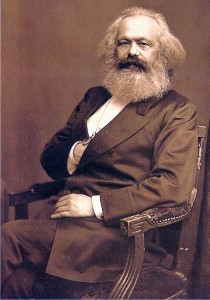Constitution
Entitlement is not freedom

In the past few weeks, many people have taken fresh interest in “scientific evidence” that liberals are somehow smarter than conservatives. In all the excitement, one man claiming to have found such “evidence” admits, bald-faced, that liberalism is all about entitlement. So an old proverb bears repeating: entitlement is not freedom, Indeed entitlement and freedom work against one another. When one wins, the other loses. Every person, especially in a nominally free society, must choose.
Entitlement as a positive right
The man now holding office as President, Barack H. Obama, said something interesting while he was still a State Senator in 2001. He called the Constitution “a charter of negative liberties.”
It says what the…government can’t do to you, but it doesn’t say what the…government must do on your behalf.
Obama went on to call specifically for the government to redistribute wealth. Others warned of what Obama’s words meant for how he would govern, to no avail. People did not heed those warnings because they did not understand the difference between entitlement and freedom. Until Americans distinguish between the two, and unless they choose freedom, they will lose freedom, and with no true guarantee of entitlement, either.
Daniel Greenfield does an excellent job of distinguishing entitlement from freedom. He also explains what “negative liberties” means. Today, says Greenfield, Americans sometimes call for two kinds of rights: positive and negative. Greenfield defines them exactly as Obama did in 2001: negative rights are the rights to expect the government not to do something to you. Positive rights are the rights to expect the government to do something for you.
He then lays it on the line. Positive right equals entitlement. Negative right equals freedom. And the two are not equivalent, and cannot coexist easily.
Two examples can show what Greenfield means. The Constitution reads in part,
No person…shall be compelled to be a witness against himself.
Those are freedoms. A person whom the State suspects of a crime, is free to testify on his own behalf, or not, as he wishes. Similarly,
Congress shall make no law…abridging the freedom of speech.
So a person is free to say, or not to say, anything he pleases. But; no one need give him a place to speak, or the means to publish his speech. The government makes him free to speak, but does not entitle him to speak, or to expect anyone to listen to him or cause others to listen. For that, he is on his own.
But the Constitution also says:
In all criminal prosecutions, the accused shall enjoy the right to a speedy and public trial, by an impartial jury of the State and district wherein the crime shall have been committed, which district shall have been previously ascertained by law, and to be informed of the nature and cause of the accusation; to be confronted with the witnesses against him; to have compulsory process for obtaining witnesses in his favor, and to have the Assistance of Counsel for his defence.
Those are entitlements. The government entitles a criminal defendant to certain things, including to force others to testify in his favor, whether they want to or not.
And here, entitlement and freedom clash. A defendant’s right to compel someone to testify in his favor trumps the witness’ right to “stay out of it.”
Entitlement as liberals want it
Saloshi Kanazawa wrote one of many studies that purport to show that liberals are smarter than conservatives. He defined liberalism this way:
Liberalism [is] the genuine concern for the welfare of genetically unrelated others and the willingness to contribute larger proportions of private resources for the welfare of such others.
[ezadsense midpost]
The problem: Kanazawa is not talking about private charity. He is talking about entitlement. He says that a sound, liberal government entitles its citizens and residents to a certain level of specific welfare, whether their fellow citizens and lawful residents want to give them those things or not. Here is a classic clash: some people are entitled to certain things, and other people are no longer free to use all their own substance for themselves as a result.
The zero-sum game
The clash between entitlement and freedom is always a zero-sum game. Entitlement and freedom always work against one another. Sometimes this works out for one person only. Thus if you were free to refuse treatment for a mental condition that might lead you to commit a crime, you are no longer entitled to excuse yourself from punishment for that crime because your mind was not sound. (Thomas Szasz has long called on government not to commit someone involuntarily for mental health treatment, and for courts not to excuse anyone from punishment by reason of temporary, or permanent, “insanity.”)
But for most people, one person’s entitlement deprives another of his freedom. So if the government entitles one person to a home, someone else, or more likely several other persons, lose the freedom to buy the things that the price of that home would have bought for them.
The extreme working of the entitlement idea comes, of course, from Karl Marx:
From each, according to his ability, to each, according to his need.
This, as Ayn Rand observed, begs the question:
What’s whose ability and which of whose needs come first?
But Daniel Greenfield, in closing, makes this point about how freedom is more likely to survive in the long run:
When positive and negative rights collide, freedom is the first casualty, and the second casualty is the positive right which over time cannot survive the pressures of the self-destruction of the system that imposes it. Negative rights which require state inaction can be sustained so long as the state does not become too powerful. Positive rights can only be sustained so long as the money and power holds up. Their fate is thoroughly tied to the fate of the system. When the state that enforces them weakens, so do they.
Ayn Rand said something similar: that when the entitlement state collapses, the people remain. And the people can then take back their freedom. But if the people want to avoid such a collapse, they must choose—now—between freedom and entitlement, and select freedom.
[amazon_carousel widget_type=”ASINList” width=”500″ height=”250″ title=”” market_place=”US” shuffle_products=”True” show_border=”False” asin=”B00375LOEG, 0451947673, 0800733940, 0062073303, 1595230734, 1936218003, 0981559662, 1935071874, 1932172378″ /]
[ezadsense leadout]
Terry A. Hurlbut has been a student of politics, philosophy, and science for more than 35 years. He is a graduate of Yale College and has served as a physician-level laboratory administrator in a 250-bed community hospital. He also is a serious student of the Bible, is conversant in its two primary original languages, and has followed the creation-science movement closely since 1993.
-

 Accountability3 days ago
Accountability3 days agoWaste of the Day: Principal Bought Lobster with School Funds
-

 Constitution2 days ago
Constitution2 days agoTrump, Canada, and the Constitutional Problem Beneath the Bridge
-

 Executive1 day ago
Executive1 day agoHow Relaxed COVID-Era Rules Fueled Minnesota’s Biggest Scam
-

 Civilization5 hours ago
Civilization5 hours agoWhy Europe Shouldn’t Be Upset at Trump’s Venezuelan Actions
-

 Civilization1 day ago
Civilization1 day agoThe End of Purple States and Competitive Districts
-

 Christianity Today5 hours ago
Christianity Today5 hours agoSurprising Revival: Gen Z Men & Highly Educated Lead Return to Religion
-

 Civilization5 days ago
Civilization5 days agoThe devil is in the details
-

 Executive4 days ago
Executive4 days agoTwo New Books Bash Covid Failures












Ayn said a lot of things. She said smoking is a positive symbol and morally right. She also said smoking didn’t cause lung cancer.
She claimed anyone who took government welfare was a parasite. When, after a lifetime of heavy smoking, Ayn Rand somehow got lung cancer, she started burning through Medicare like a pack of Parliaments.
“The clash between entitlement and freedom is always a zero-sum game. Entitlement and freedom always work against one another.”
What is education if it is not an entitlement that guarantees freedom?
Except that, when it comes to education, the claim is on the parents, not the government. The government has no obligation to provide an education, and a free people have every reason to tell the government to stay out of education.
Unlike the United States Constitution that makes no reference to education, many state constitutions require states to provide an “adequate” education to its residents.
My parents would not have been able to afford to send me and my three siblings to private schooling, nor could have they educated me to the level I needed to be to go to university. Public schooling is the single greatest thing that ever happened to me. In two months I will have finished my phd and I am looking to have fabulous job oppertunities ahead of me. I will earn more in my first year than the highest wage my father earnt in his life adjusting for inflation. I have more choices in my life than my parents thanks to the entitlement of public education and the gifts God gave me. If I have to pay a little more tax to pay it back and give another child the same oppertunity, I will pay it gladly.
[…] Entitlement is not freedom […]
[…] Entitlement is not freedom […]
[…] Entitlement is not freedom […]